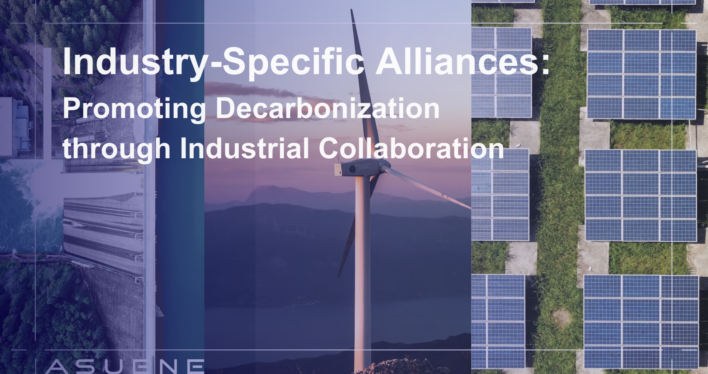- Article Summary
-
The Rise of Sector-Specific Climate Action
In recent years, climate ambition has moved from boardroom promises to sector-wide action. As governments tighten regulations and investors demand more from ESG performance, industries across the globe are mobilizing to decarbonize.
This momentum is driven by the realization that many carbon-intensive sectors—like aviation, shipping, construction, and manufacturing—require collective strategies, not just individual actions. Net-zero targets are no longer aspirational; they are fast becoming operational mandates. And to meet them, companies are turning to industry-specific alliances that provide shared standards, pathways, and credibility.
From shipping giants working on zero-emission vessels to food retailers aligning on Scope 3 targets, these alliances are shaping the next frontier of climate leadership.

Why Industry Alliances Are Critical
The climate crisis is systemic, and so must be the solutions. No single company can decarbonize a supply chain, build out charging infrastructure, or create market demand for green cement or steel on its own.
Many sectors also face “hard-to-abate” challenges due to long asset cycles, high upfront capital costs, and cross-border dependencies. That’s why global climate action has increasingly taken the shape of sectoral coalitions and industry-led platforms.
These alliances:
- Help align companies around a shared science-based roadmap
- Provide technical guidance and verification frameworks
- Facilitate joint investment, procurement, and policy advocacy
- Enable small and mid-sized players to act with scale and credibility
The emergence of these groups has been further accelerated by international frameworks like the Paris Agreement, Race to Zero, and the UN High-Level Champions’ 2030 Breakthroughs.

Global Industry Alliances for Decarbonization: A Sector-by-Sector Guide
Aviation Industry
| Organization | Type | Scope | Key Actions | Founded |
|---|---|---|---|---|
| ICAO | UN specialized agency | International aviation | LTAG (Net-zero 2050), CORSIA offset scheme | 1944 |
| ATAG | Industry coalition | Aviation value chain | Advocacy for net-zero pathways | 1990 |
| IATA | Airline trade body | Airlines | SAF scaling, operational efficiency improvements | 1945 |
Example Companies and Actions:
- British Airways and Lufthansa participate in SAF trials through IATA.
- Airbus contributes to ATAG’s net-zero roadmap by developing hydrogen aircraft concepts.
- ICAO’s CORSIA scheme is being implemented by over 100 national carriers.
Maritime Shipping
| Organization | Type | Scope | Key Actions | Founded |
|---|---|---|---|---|
| IMO | UN regulatory agency | International shipping | GHG Strategy, EEDI/EEXI standards, net-zero by 2050 | 1948 |
| Getting to Zero Coalition | Public-private partnership | Shipping & fuels | Zero-emission ship deployment by 2030 | 2019 |
Example Companies and Actions:
- Maersk has ordered 25+ methanol-fueled ships, aligned with the coalition’s targets.
- IMO’s mandatory CII ratings are influencing global shipping logistics and fleet renewal.
Heavy Industry and Materials
| Organization | Type | Scope | Key Actions | Founded |
|---|---|---|---|---|
| Mission Possible Partnership | Multi-stakeholder platform | Steel, cement, chemicals, etc. | Sectoral roadmaps, blended finance, demand coalitions | 2020 |
| GCCA | Industry association | Cement and concrete | Net-zero roadmap, CO₂ performance benchmarks | 2018 |
| First Movers Coalition | Gov.-corporate initiative | Hard-to-abate sectors | Demand aggregation for early clean tech | 2021 |
Example Companies and Actions:
- Holcim and HeidelbergCement publish net-zero strategies via GCCA.
- ArcelorMittal pilots hydrogen steelmaking under MPP support.
- Microsoft and Amazon joined First Movers to secure green materials.
Road Transport
| Organization | Type | Scope | Key Actions | Founded |
|---|---|---|---|---|
| ZEV Alliance | Governmental coalition | Passenger vehicles | 100% ZEV sales by 2035–2050 | 2015 |
| EV100 | Corporate initiative | Corporate fleets | Electrify fleets by 2030 | 2017 |
Example Companies and Actions:
- California mandates 100% ZEV sales by 2035 under ZEV Alliance.
- IKEA, DHL, and Siemens have committed to 100% EV fleets under EV100.
Buildings and Construction
| Organization | Type | Scope | Key Actions | Founded |
|---|---|---|---|---|
| WGBC | NGO network | Buildings and infrastructure | Net Zero Carbon Buildings Commitment | 2002 |
| National GBCs | Local nonprofit bodies | Country-level real estate | Certification (LEED, BREEAM), policy influence | Various |
Example Companies and Actions:
- Lendlease and JLL are WGBC signatories working on net-zero buildings.
- Singapore’s BCA and UKGBC implement national net-zero frameworks.
Consumer Goods and Retail
| Organization | Type | Scope | Key Actions | Founded |
|---|---|---|---|---|
| CGF | CEO-led industry forum | Retail, FMCG | Net-zero alignment, supplier decarbonization | 2009 |
| Race to Zero | UN climate campaign | Cross-sectoral | 1.5°C targets, science-based verification | 2020 |
Example Companies and Actions:
- Unilever, Nestlé, and Walmart disclose Scope 3 emissions through Race to Zero.
- CGF supports regenerative agriculture and green transport projects across its members.
Cross-Sectoral Climate Coordination
| Organization | Type | Scope | Key Actions | Founded |
|---|---|---|---|---|
| SBTi | Verification body | All industries | Science-based target setting | 2015 |
| CDP | Disclosure platform | Corporate and supply chains | Emissions data and performance metrics | 2000 |
| We Mean Business | NGO-business coalition | Global | Unified business advocacy for climate | 2014 |
Example Companies and Actions:
Apple, Nike, and IKEA report annually through CDP and back unified disclosure standards via We Mean Business.
Over 4,000 companies have SBTi-approved targets.
Toward a Net-Zero Global Economy
Industry alliances are no longer fringe efforts—they are becoming the backbone of climate transition. Whether you are a policymaker, business leader, or investor, understanding and engaging with these alliances is essential.
They turn ambition into action, pilot the technologies of the future, and de-risk the enormous transformation underway. They are also hubs for innovation, trust-building, and accountability.
The path to net-zero is complex, but thanks to these sectoral alliances, no one has to walk it alone.
Why Work with ASUENE Inc.?
Asuene is a key player in carbon accounting, offering a comprehensive platform that measures, reduces, and reports emissions, including Scope 1-3, with expertise in decarbonization. Asuene serves over 10,000 clients worldwide, providing an all-in-one solution that integrates GHG accounting, ESG supply chain management, a Carbon Credit exchange platform, and third-party verification.
ASUENE supports companies in achieving net-zero goals through advanced technology, consulting services, and an extensive network.


